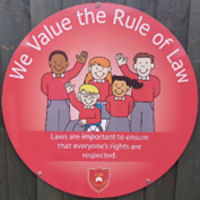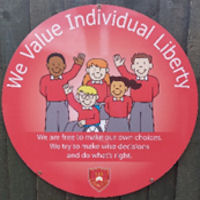Vision, Values and Ethos
Mission Statement
Living, Learning and Growing in God’s Love
Our Mission Statement is evident as soon as you step through the doors of St John Bosco Catholic Primary School and see that Christ is at the centre of everything that we do.
Staff ensure that everyone is treated with care, love and respect, and all children are able to explore and recognise their God-given talents. Every member of our school community is valued, nurtured and respected. Through our Gospel values and the teaching of British Values, we welcome our catholic families and all faiths are welcomed.
Each year we review the school Mission Statement and this year, children once again, agreed that they wanted to keep it as they believe it summarises exactly what the school aims to achieve. It is embedded in our school prayer and through our daily prayers we are reminded of the words and God’s Love.
This year children used art to express their understanding and show the deeper meaning of the mission statement. Look at the wonderful expression of art below.
We will continue our mission of living out our faith in our actions and words each day.


Vision
Our vision for St John Bosco Catholic Primary School is to enable all children to achieve their full potential in a safe, welcoming and happy learning environment.
We will strive to create responsible citizens who are independent and confident lifelong learners equipped to meet the challenges of a changing future.
This will be achieved within an inclusive school that values every individual and celebrates the diversity of our community.
Also see: Protected Characteristics
Ethos
Equality Statement
At St John Bosco Catholic Primary School, we are committed to ensuring equality of opportunity for all pupils, staff, parents and carers irrespective of race, gender, disability, belief, sexual orientation, age or socio-economic background. Through our mission statement and Catholic beliefs, we aim to develop a culture of inclusion and diversity in which all members of our school and parish family feel proud of their identity and ability to participate fully in school life.
We tackle discrimination through the positive promotion of equality, by challenging bullying and stereotypes and by creating an inclusive environment. We give pupils the opportunity to have specific roles and responsibilities so that they can learn through real-life experiences. Roles such as FAB, Friends Against Bullies, School Pupil Leaders, Sports Leaders, Safeguarding Champions allow children to work alongside each other, peer-to-peer to problem solve daily issues that arise.
At St John Bosco Catholic Primary School, we believe that diversity is a strength which should be respected and celebrated by all those who learn, teach and visit us. Through regular assemblies and enhancement days, we offer a deeper understanding of diversity; we recognise, respect and celebrate differences.
Equality Objectives
Objective 1: To narrow the gap between the progress made by all disadvantaged children by promoting the Premium First Strategy in all areas of school life. To ensure that our curriculum reflects diversity across all our provision.
Objective 2: Train all members of staff and governors on equal opportunities and non-discrimination. Training evaluation data will show that 100% of those attending have a good understanding of the legal requirements.
Objective 3: To ensure that future reviews of all school policies include information about and links to equality. To ensure that our curriculum reflects diversity across all our provision.
Objective 4: Adopting a whole-school approach on how to deal with and record issues in school. CPOMs to be used by all staff to log concerns and data to be tracked, analysed and acted upon by senior leaders.
Equality in Teaching and Learning
We provide all our pupils with the opportunity to succeed and to reach the highest level of personal achievement. We do this by:
- Providing a rich curriculum and strong Catholic ethos to instil the Gospel values in our children, teaching them to be kind, caring, forgiving and respectful young people.
- Ensuring equality of access for all pupils and preparing them for life in a diverse society.
- Promoting attitudes and values that challenge any discriminatory behaviour or prejudice.
- Have high expectations of all children and to provide varied learning experiences within a broad and balanced curriculum.
- Providing opportunities for pupils to appreciate their own religion and culture and celebrate the diversity of other religions and cultures.
- Seeking to involve all parents in supporting their child’s education.
- Utilising teaching approaches appropriate for the whole school population which are inclusive and reflective of our pupils.
- Make links between the teachings of Jesus and how we behave and treat others in our own lives.
- To develop self-esteem, respect and social skills enabling children to form positive relationships within school and in the context of a modern multi-cultural society.
The Public Sector Equality Act
The information provided in this section shows how we are meeting the public sector equality duty. We are required to have due regard for the need to:
- Eliminate discrimination, harassment, victimisation and other conduct that is prohibited by the Equality Act 2010.
- Advance equality of opportunity between people who share a protected characteristic and people who do not share it.
- Foster good relations across all protected characteristics.
The information below is a summary of how we have due regard to the need to eliminate discrimination, harassment and victimisation. Please contact us if you would like to see copies of any of our policies or refer to the Policies section of this website.
We are aware of the requirements of the Equality Act 2010 that it is unlawful to discriminate, treat some people less fairly or put them at a disadvantage.
Senior leaders in our school and our governors are clear on their legal responsibilities under the Equality Act 2010 and have also been involved in supporting our school to meet their public-sector equality duty.
- We try to keep an accurate record, when possible and appropriate, of the protected characteristics of our pupils and employees.
- We have behaviour expectations and codes of conduct that outline our expectations of both pupils and staff in their interactions with each other, including our approach to tackling bullying, prejudice and discrimination.
- We deal promptly and effectively with all incidents and complaints of bullying and harassment.
- We keep a record of all such incidents and notify those affected of what action we have taken.
- We provide training to all staff in relation to dealing with bullying and incidents of harassment.
- We have a Special Educational Needs Framework which outlines the provision the school makes for pupils with special educational needs.
- Our complaints policy sets out the procedures through which we deal with any complaints.
- We aim to observe and implement the principles of equal opportunities and non‐discrimination in our employment practices.
- We pay due regard within our recruitment practices, to safeguarding and protecting our pupils.
- We have procedures for addressing staff discipline, conduct and grievances.
British Values
Promoting British Values at St John Bosco Catholic Primary School
We teach pupils the fundamental British values of democracy, the rule of law, individual liberty and mutual respect and tolerance of those with different faiths and beliefs.
As a Catholic school we follow the Gospel teachings – to love God and love one another. We follow the example set by Jesus. We believe we are all made in the image and likeness of God.
We show our love for others through contributing to the common good.
We show our love for others through respect for all members of God’s family and as such reject all discrimination of any kind.
This forms the basis for all that we do at St John Bosco and ensures British Values are an integral part of this. See our: British Values Poster
Democracy
Pupils have the opportunity to have their voices heard through our School Council and pupil questionnaires. The children have the chance to elect a representative from each class that they feel will represent their classes views. School council candidates were required to prepare campaign speeches outlining their suitability for the role and their vision for the school. The school council is actively involved in the life of the school and in decision making processes.

The Rule of Law
The importance of Laws, whether they be those that govern the class, the school, or the country, are consistently reinforced throughout the school day, as well as when dealing with behaviour and through school assemblies. Pupils are taught the value and reasons behind laws, that they govern and protect us, the responsibilities that this involves and the consequences when laws are broken.

Individual Liberty
Within school, pupils are actively encouraged to make choices, knowing that they are in a safe and supportive environment. As a school we educate and provide boundaries for young pupils to make choices safely, through our provision of a safe environment and empowering education. Pupils are encouraged to know, understand and exercise their rights and personal freedoms and advise how to exercise these choices wisely.

Mutual Respect
This is a fundamental part of our Faith and school ethos. Pupils have regular discussions and assemblies on what respect means and how it is shown to others. We value tolerance of those with different faiths and beliefs and those without faith.

Tolerance of those of Different Faiths and Beliefs
This is achieved through enhancing pupils understanding of their place in a culturally diverse society and by giving them opportunities to experience such diversity. Through our Faith-filled Friday activities, each year group completes an in-depth study on different cultures and faiths which is also part of the RE scheme of work. This is supported by visits to places of Worship. Their learning is then showcased through assemblies where pupils share their learning and knowledge with other children and parents.

